|
|
Cheesefare Sunday The last Sunday before the Great Lent, Cheesefare Sunday, is also the last day of preparation. The last Sunday before the Great Lent, Cheesefare Sunday, is also the last day of preparation. The Twelve Holy Martyrs who suffered in the reign of the Emperor Diocletian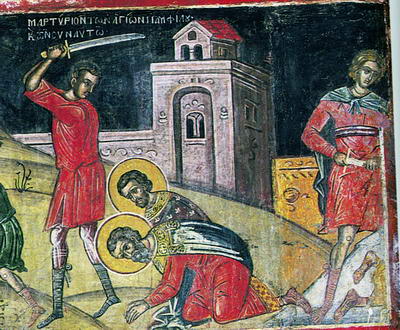 The first of these, Pamphilus, was priest in the church at Caesarea in Palestine; a learned and devout man, he corrected the mistakes of various copiers in the text of the New Testament. He himself copied this saving Book and gave it to any who desired it. The second was a deacon, Valentine, old in years and white with wisdom. He was a great expert in the Holy Scriptures, knowing them by heart. The third was Paul, a respected and eminent man, who had on a previous occasion been cast into the fire for the sake of Christ. With them were five Egyptians, brothers both in blood and soul, who were returning to their native land from serving a sentence in the mines of Cilicia. As they reached the gate of the town of Caesarea they said that they were Christians, and were therefore brought to trial. When asked their names, they replied: "We have cast away the pagan names given us by our mother, and are called Elias, Isaiah, Jeremiah, Samuel and Daniel." When asked where they were from, they replied: "From Jerusalem that is above." They were all beheaded, and a young man called Porphyrius, who had searched for their bodies to give them burial, suffered soon afterwards. Him they burned. An officer, Seleucus, who had come up to the martyrs and embraced them before the sword descended on their heads, was also burned, and an old man, Theodulus, a servant of the Roman judge, who had embraced one of the martyrs while they were under escort. Lastly Julian, who had kissed the dead bodies of the martyrs and honoured them, followed them in death. So they exchanged the small for the great, the tawdry for the precious and death for immortality, and went to the Lord in 308. The first of these, Pamphilus, was priest in the church at Caesarea in Palestine; a learned and devout man, he corrected the mistakes of various copiers in the text of the New Testament. He himself copied this saving Book and gave it to any who desired it. The second was a deacon, Valentine, old in years and white with wisdom. He was a great expert in the Holy Scriptures, knowing them by heart. The third was Paul, a respected and eminent man, who had on a previous occasion been cast into the fire for the sake of Christ. With them were five Egyptians, brothers both in blood and soul, who were returning to their native land from serving a sentence in the mines of Cilicia. As they reached the gate of the town of Caesarea they said that they were Christians, and were therefore brought to trial. When asked their names, they replied: "We have cast away the pagan names given us by our mother, and are called Elias, Isaiah, Jeremiah, Samuel and Daniel." When asked where they were from, they replied: "From Jerusalem that is above." They were all beheaded, and a young man called Porphyrius, who had searched for their bodies to give them burial, suffered soon afterwards. Him they burned. An officer, Seleucus, who had come up to the martyrs and embraced them before the sword descended on their heads, was also burned, and an old man, Theodulus, a servant of the Roman judge, who had embraced one of the martyrs while they were under escort. Lastly Julian, who had kissed the dead bodies of the martyrs and honoured them, followed them in death. So they exchanged the small for the great, the tawdry for the precious and death for immortality, and went to the Lord in 308.St Maruthas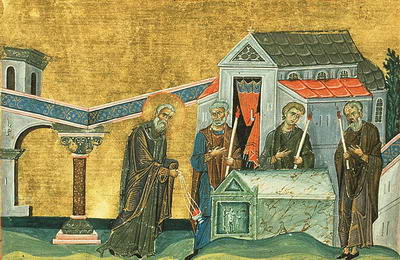 Bishop of the town of Tagrith in Mesopotamia, he was famed for his faith and goodness. Maruthas calmed the wrath of the Persian King Yezdegeherd against the Christians, begged from him the relics of the 400 martyrs in Persia and founded a town, Martyropolis, where he placed these holy relics. He finished his earthly course in this town in 422 and went to the Lord. Bishop of the town of Tagrith in Mesopotamia, he was famed for his faith and goodness. Maruthas calmed the wrath of the Persian King Yezdegeherd against the Christians, begged from him the relics of the 400 martyrs in Persia and founded a town, Martyropolis, where he placed these holy relics. He finished his earthly course in this town in 422 and went to the Lord.Our Holy Father the Martyr Romanus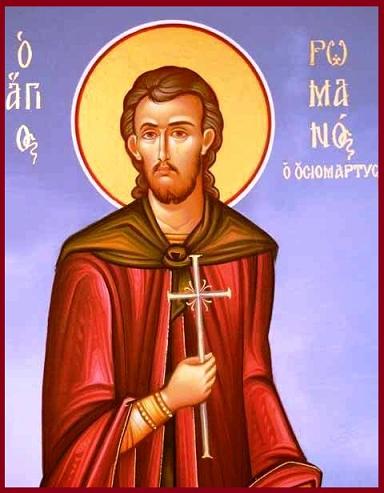 Romanus was a simple and illiterate villager from Carpenesion. Leaming of the heroism and the glory of the martyrs of Christ, the young Romanus yearned for martyrdom himself. He went to Salonica, where he began to extol the Christian faith in the streets, and to call Mahomet a writer of fables. The Turks tortured him terribly, then handed him over to a galley-captain. Christians rescued him from the galley and sent him to the Holy Mountain, where Romanus became a monk under the famous Starets Acacius. But he still yearned for martyrdom for the sake of Christ. With the blessing of his starets, he went to Constantinople, pretended to be a fool and began to lead a dog about the streets. When asked why, Romanus replied that he fed that dog as Christians fed Turks. The Turks threw him into a dry well, where he lived without bread for forty days. They then took him out and executed him. Light streamed from his body for three days, after which an Englishman took it to England. But a monk soaked a towel in his blood, and that towel is kept to this day in the monastery of Docheiariou. This glorious soldier of Christ suffered in 1694. Romanus was a simple and illiterate villager from Carpenesion. Leaming of the heroism and the glory of the martyrs of Christ, the young Romanus yearned for martyrdom himself. He went to Salonica, where he began to extol the Christian faith in the streets, and to call Mahomet a writer of fables. The Turks tortured him terribly, then handed him over to a galley-captain. Christians rescued him from the galley and sent him to the Holy Mountain, where Romanus became a monk under the famous Starets Acacius. But he still yearned for martyrdom for the sake of Christ. With the blessing of his starets, he went to Constantinople, pretended to be a fool and began to lead a dog about the streets. When asked why, Romanus replied that he fed that dog as Christians fed Turks. The Turks threw him into a dry well, where he lived without bread for forty days. They then took him out and executed him. Light streamed from his body for three days, after which an Englishman took it to England. But a monk soaked a towel in his blood, and that towel is kept to this day in the monastery of Docheiariou. This glorious soldier of Christ suffered in 1694.Persian Martyrs in Martyropolis in Mesopotamia
St Maruthas the Bishop of Martyropolis in Mesopotamia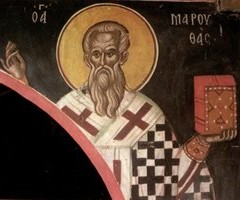 Saint Maruthas was Bishop of Tagrith (Martyropolis), a city which he founded between the Byzantine Empire and Persia. He was famed for his knowledge and his piety, he wrote about the martyrs, and he suffered for his faith in Christ under the Persian emperor Sapor. He also left behind other works in the Syrian language, among which the most famous are: “Commentary on the Gospel,” “Verses of Maruthas,” “Liturgy of Maruthas” and “The 73 Canons of the Ecumenical Council at Nicea” (325) with an account of the acts of the Council.
In the year 381 St Maruthas participated in the Second Ecumenical Council at Constantinople, convened against the heresy of Macedonius. In 383, he attended the Council of Antioch against the Messalians.
During the years 403-404 St Maruthas set off to Constantinople to plead with the emperor Arcadius to protect Persian Christians. He was twice sent by the emperor Theodosius the Younger to the Shah Izdegerd to secure the peace between the Empire and Persia.
In the year 414 St Maruthas, having done his duty as envoy to the court of Izdegerd, persuaded the Shah to a favorable disposition towards Christians, and he assisted greatly in the freedom of Christians in Persia. He rebuilt Christian churches razed during the persecution by the Persian ruler Sapor. He also located relics of saints who had suffered martyrdom and transferred them to Martyropolis. He died there in 422. The relics of St Maruthas were later transferred to Egypt and placed in a skete monastery of the Mother of God. Saint Maruthas was Bishop of Tagrith (Martyropolis), a city which he founded between the Byzantine Empire and Persia. He was famed for his knowledge and his piety, he wrote about the martyrs, and he suffered for his faith in Christ under the Persian emperor Sapor. He also left behind other works in the Syrian language, among which the most famous are: “Commentary on the Gospel,” “Verses of Maruthas,” “Liturgy of Maruthas” and “The 73 Canons of the Ecumenical Council at Nicea” (325) with an account of the acts of the Council.
In the year 381 St Maruthas participated in the Second Ecumenical Council at Constantinople, convened against the heresy of Macedonius. In 383, he attended the Council of Antioch against the Messalians.
During the years 403-404 St Maruthas set off to Constantinople to plead with the emperor Arcadius to protect Persian Christians. He was twice sent by the emperor Theodosius the Younger to the Shah Izdegerd to secure the peace between the Empire and Persia.
In the year 414 St Maruthas, having done his duty as envoy to the court of Izdegerd, persuaded the Shah to a favorable disposition towards Christians, and he assisted greatly in the freedom of Christians in Persia. He rebuilt Christian churches razed during the persecution by the Persian ruler Sapor. He also located relics of saints who had suffered martyrdom and transferred them to Martyropolis. He died there in 422. The relics of St Maruthas were later transferred to Egypt and placed in a skete monastery of the Mother of God. Martyrs Porphyrios, Seleucios, Theodoulos, Julian, Samuel, Ilias, Daniel, Jeremiah and Isaiah The 12 Martyred Saints – Pamphilos the Presbyter, Valentus (Ualentos) the Deacon, Paul, Porphyrios, Seleucios, Theodoulos, Julian, Samuel, Ilias, Daniel, Jeremiah and Isaiah suffered during the time of a persecution against christians, initiated by the emperor Diocletian in the years 308-309 at Caesarea in Palestine. The holy martyr Pamphilos, a native of the city of Berit (Beirut), received his education at Alexandria, after which he was made presbyter at Caesarea. He laboured much over the collation and correction of copyist errors in texts of the New Testament. The corrected texts of Saint Pamphilos were copied out and distributed to those wanting them. In such form many pagans were converted to Christ through them. His works and concerned matters at Caesarea were gathered up into the extensive library of spiritual books available for the enlightening of christians. Blessed Jerome (IV – beginning V Century) deeply respected Saint Pamphilos and considered himself fortuneate to have located and come into possession of several of his manuscripts. Actively assisting Saint Pamphilos in proclaiming the faith in Christ were Saint Valentus, deacon of the church at Eleia – a man bent over with age and well-versed in the Holy Scriptures, and Saint Paul, ardent in faith and love for Christ the Saviour. All three were imprisoned for 2 years by the governor of Palestinian Caesarea, Urban. During the rule of his successor Firmilian, 130 christians were sentenced in Egypt and sent off to Cilicia (Asia Minor) to work in the gold mines. Five young brothers accompanied them there to the place of exile. On the return journey to Egypt they were detained at Caesarea and thrown into prison for confessing Christ. They brought the youths for judgement to Firmilian, together with those imprisoned earlier – Saints Pamphilos, Valentus and Paul. Having been named with names of Old Testament prophets – Ilias, Jeremiah, Isaiah, Samuel and Daniel – the youths answered the question of their fatherland by saying, that they were citizens of Jerusalem, meaning by this the heavenly Jerusalem. Firmilian knew nothing about a such-named city, since on the site of Jerusalem – razed to the ground by the emperor Titus in the year 70 – had been constructed a new city by the emperor Adrian (117-138), which at the time was named Eleia-Adrian. Firmilian tortured the youths for a long time. He sought to learn the location of the unknown city, and he sought to persuade the youths to apostacise. But nothing was accomplished, and the governor gave them over for beheading by the sword together with Pamphilos, Valentus and Paul.
Before this occurred, a servant of presbyter Pamphilos was given to suffer – this was the 18 year old youth Porphyrios, meek and humble. He had heard the sentence of death for the condemned martyrs, and asked the governor's permission to bury the bodies after execution. For this he was sentenced to death and given over to burning on a bon-fire.
A witness of this execution – the pious christian Seleucios, a former soldier – in saluting the deeds of the sufferers, went up to Pamphilos before execution and told him about the martyr's end of Saint Porphyrios. He was seized upon by soldiers and, on orders from Firmilian, was beheaded by the sword together with the condemned.
One of the governor's servants, Thoedoulos, a man of venerable age and secretly a christian, greeted the martyrs being led to execution, gave them a kiss and asked them to pray for him. He was taken by soldiers for questioning to Firmilian, on whose orders he was crucified on a cross.
The youth Julian, a native of Cappadocia who had come to Caesarea, caught view of the bodies of the saints which had been thrown to wild beasts without burial. Julian went down on his knees and venerated the bodies of the sufferers. Soldiers standing by at the wall seized hold of him and took him to the governor, who condemned him to burning. The bodies of all 12 martyrs stayed without burial for 4 days. Neither beasts nor birds would touch them. Embarrassed by this situation, the pagans permitted christians to take the bodies of the martyrs and bury them.
Saint Flavian, Archbishop of Antioch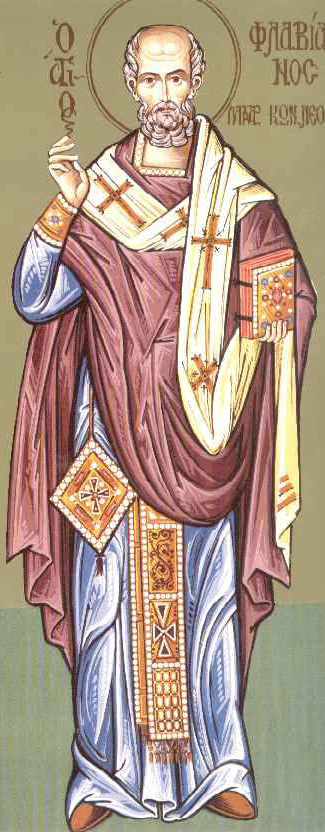 Saint Flavian, Archbishop of Antioch, was a contemporary of St John Chrysostom. He attempted to obtain from the emperor Theodosius (379-395) a pardon for the citizens of Antioch, who had angered the emperor by destroying his statue. St Flavian’s death was peaceful and without illness. He is also commemorated on September 27. Saint Flavian, Archbishop of Antioch, was a contemporary of St John Chrysostom. He attempted to obtain from the emperor Theodosius (379-395) a pardon for the citizens of Antioch, who had angered the emperor by destroying his statue. St Flavian’s death was peaceful and without illness. He is also commemorated on September 27. |